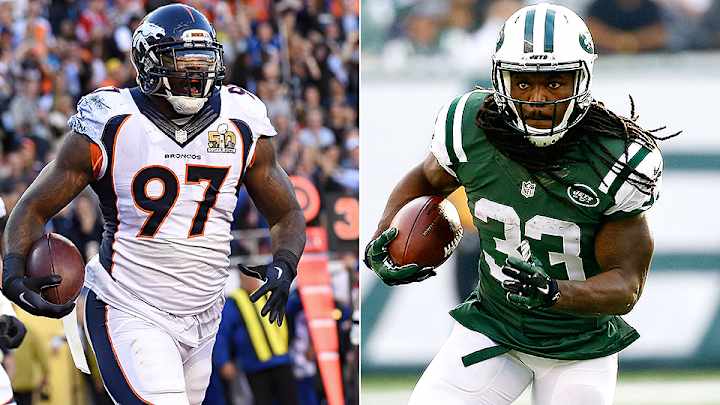After big free agency moves, it’s time for the Jaguars to win

There comes a time when you have to take the training wheels off the bike. It’s exciting and scary and necessary. And that’s where we find the Jacksonville Jaguars as they enter year No. 4 of the Gus Bradley regime. Thus far, the front office has been patient, willing to let Bradley and GM Dave Caldwell enact a strategic rebuilding plan despite a 12–36 combined record from 2012–14. But Jacksonville’s moves in the early off-season indicate that the focus has shifted.
• NFL roster cut tracker | NFL signings tracker | Top 100 free agents
The Jaguars outbid a bevy of suitors for ex-Denver defensive lineman Malik Jackson and forked over upwards of $6 million per season for rusher Chris Ivory. Then, after trying to get in on the Olivier Vernon sweepstakes, turned their attention to prized safety Tashaun Gipson, who reportedly agreed to a five-year deal in Jacksonville.
Osweiler opts for Texans, finally set to become full-time starter
And with upwards of $80 million in cap space available, including $32.7 million in carryover cash from last season, why not? Patience is a rare virtue around the NFL, but eventually the wins have to come.
To hear Caldwell tell it, this is exactly how the Jaguars expected it to go. He and Bradley wanted to get through 2013, then set the wheels in motion starting with the ’14 draft.
“When we started this process, we looked at it and said, ‘It’s going to be difficult to build both sides of the ball at the same time,’” Caldwell said at the combine. “The way the drafts were set up, the last two years were offense-heavy so we said, ‘Let’s take advantage of that. Let’s get our quarterback. Let’s build around him. Let’s get him some play-makers.’
“We feel like with the two Allens [Robinson and Hurns], T.J. Yeldon, the young offensive line, Rashad Greene, Marqise Lee and then we paid Julius Thomas—we feel we have a good core around Blake.”
• BEDARD: Grading every move of NFL free agency
Waiting to fix the defense, and being unable to improve upon it in the meantime, leaves Bradley under a bit of pressure this coming season. He built a coaching career upon his defensive expertise, including the four seasons prior to being hired by Jacksonville as Seattle’s coordinator.
2016 NFL Mock Draft: The free agency effect
With that internal focus on stockpiling the offense, though, the defense has floundered, and losing 2015 first-round pick Dante Fowler to a preseason knee injury certainly didn’t help. In Bradley’s three years with the Jaguars, his defense has ranked 28th, 26th and 31st, respectively, in points allowed.
Enter Jackson, plus whichever other free agents Caldwell chases down in the coming days. The offense could be lethal, but the defense must catch up.
“Dave Caldwell and I, when we sat down and put this together, we had a plan how we were going about doing it,” Bradley said. “I give him a lot of credit. He’s really stuck to it. We’re very transparent. We challenge one another, but the decisions we’ve made have been to try to build this thing through the draft as much as possible. ... You supplement with free agency.”
Plenty of organizations would have bailed on their guys in charge by now. Twelve wins in three years? A 5–11 mark while competing in the AFC’s worst division? A long list of coaches and GMs have been sent packing despite far better results. The Jaguars have stayed the course, which is one way to say that they didn’t necessarily expect to win much during the past three seasons.
Megatron's Goodbye: Understanding Johnson's quiet retirement
That’s a frustrating reality, but also can be unavoidable. In 2012, the year before Caldwell and Bradley’s hires, the Jaguars finished 2–14; their starting quarterback was Chad Henne; their leading rusher was Maurice Jones-Drew, who played just six games; and their defense featured just a handful of guys who could have started elsewhere. In other words, it was a complete mess.
But it’s not anymore. The Jaguars have a growing number of pieces in place around their rising third-year quarterback, and now they’re finding fixes on the other side of the ball, too.
So the rebuild, for all intents and purposes, is over. A five- or six-win season won’t cut it in 2016. Or at least, it shouldn’t. Jacksonville has taken its time laying the groundwork for a competitive club. Time to take off the training wheels and see what happens.

Chris Burke covers the NFL for Sports Illustrated and is SI.com’s lead NFL draft expert. He joined SI in 2011 and lives in Ann Arbor, Mich.